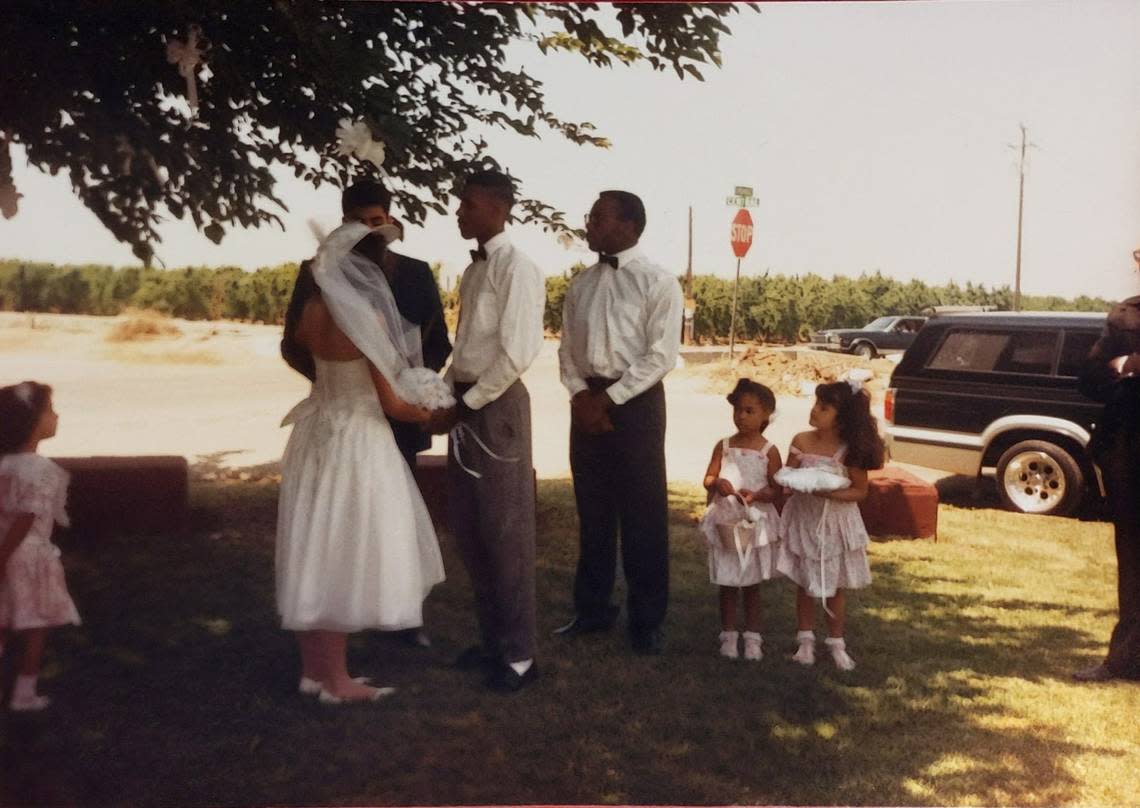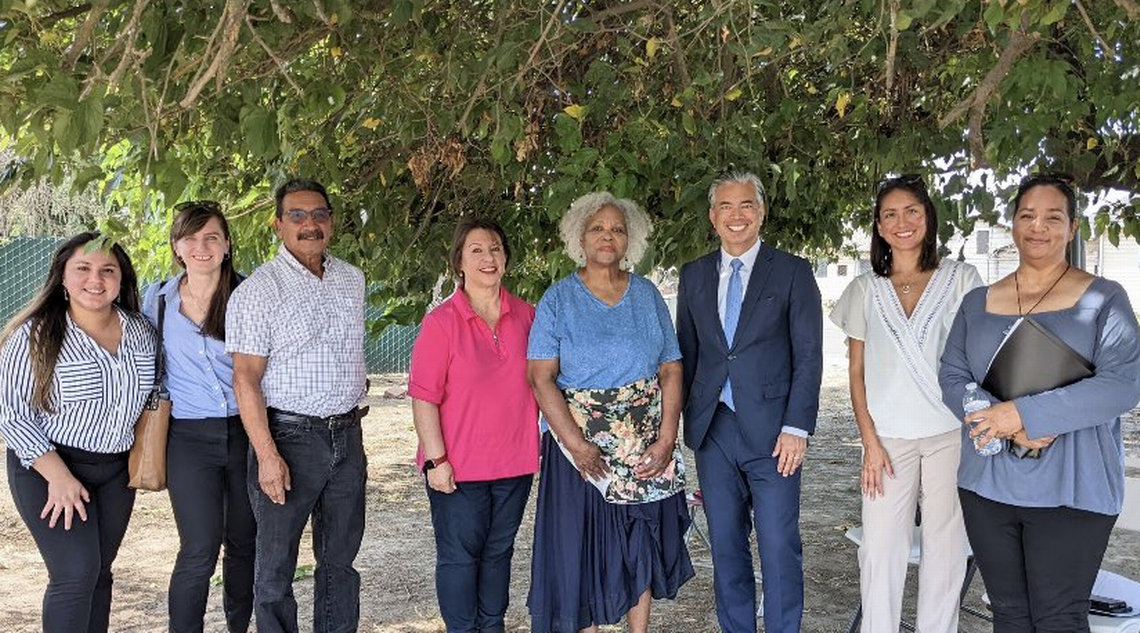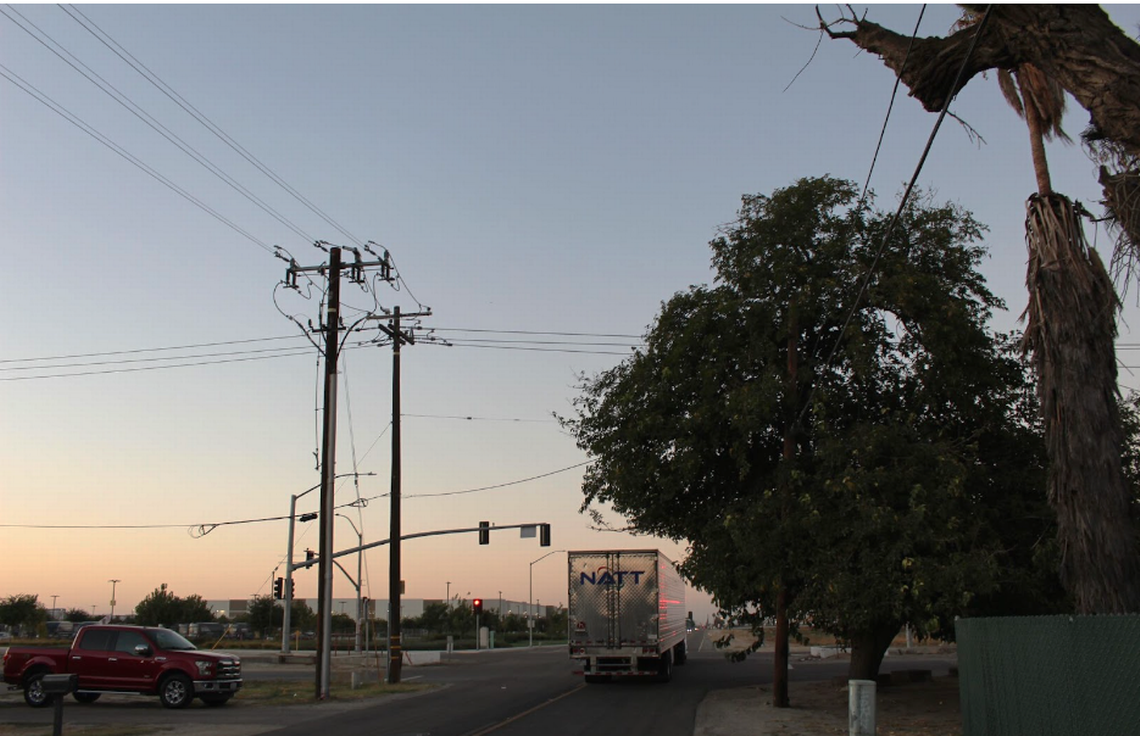California Attorney General Rob Bonta is making a new case for civil rights in Fresno
This story was originally published by Fresnoland , a nonprofit news organization dedicated to making policy public.
Across a plain of hodgepodge zoning sandwiched between highways 41 and 99 on the southern edge of Fresno, old and new land uses come to a confrontation of sorts at Katie Taylor’s doorstep.
A hundred yards from Taylor’s street-corner Central Avenue home is a 900,000-square-foot Amazon warehouse. At a rightward glance from the Big A sign, a desiccated stand of golden-brown weeds sits atop a 200-foot-tall dump site of industrial waste.
Beyond her front yard, a concrete irrigation ditch carries water to grow crops somewhere out of sight. Spanning her horizon, rusted factories dot vacant land until the mess meets Highway 99, where new steel rebar juts from a high-speed rail overpass that’s under construction.
After moving west from Louisiana in the early 1960s, and a temporary stay near the pungent meat-rendering plant on Church Avenue, Taylor settled into her mid-century ranch house when she was 23 years old.
Today at age 76, Ms. Katie – as she is affectionately known in the neighborhood – misses what used to be.
“You can’t just enjoy yourself being out there like I used to be able to,” she said.
On her third-of-an-acre plot set beside fruit orchards with a view of the Sierra Nevada, her five children grew up climbing the front yard’s massive mulberry tree.
Gatherings of all sorts happened by this neighborhood tree, whose canopy stretches 70 feet across. For decades, neighbors would often chat there, Ms. Katie said, or farmworkers from the surrounding peach and nectarine orchards would take a break under the tree’s shade on a hot day. When her boys had grown up and got married, two of them took their wedding vows under the mulberry tree.

But beginning in 2017, without notice, the fabric of Ms. Katie’s neighborhood began to change.
“When I saw the orchard trees being plowed down across the street, I did not know why,” Ms. Katie wrote in a testimony to the City of Fresno. “I thought the property owners were just going to plant more fruit trees.”
Instead, the land across the street was being cleared for a million-plus square feet of warehouse space for Amazon and Ulta Beauty.
During the months-long construction period, the vibrations from the construction were so severe that her house shook, Ms. Katie said. The steady march of big trucks coming and going has continued since: “You can’t really rest.”
Since the logistics industry came to her neighborhood, she says, the warehouses’ stretch of concrete radiates the afternoon heat long after the sun has set, and the neighborhood no longer cools down much at night. Ms. Katie says this has raised her electricity bills.
Between the heat and the constant truck traffic, Ms. Katie says her neighbors have cut back on their walks, and she spends less time tending to her front yard garden.
“There’s so much noise now, it’s hard to work out in the front because it’s very distracting, very disturbing.”
In cases like Ms. Katie’s, Rob Bonta is fighting back
When a warehouse goes up down the street, and residents find a new chaos that won’t leave, they seek justice. So when the Amazon facility started operating in 2018, Ms. Katie and her neighbors mobilized to put pressure on the city of Fresno’s growth agenda in their neighborhood.
She and her neighbors say the city has not followed through with hard-won promises to restore the walkability of their neighborhood using warehouse development fees from companies like Amazon.
Like so many other times over the last six decades, neighbors gathered under the shade of Ms. Katie’s mulberry tree to take an inventory of the past five years.

From the lack of high-tech crosswalks, to stalled pedestrian safety improvements, to failed road maintenance plans, they were trying to figure out how to get more follow-through from the city.
But under the tree this time, south Fresno had a new, high-powered ally: California Attorney General Rob Bonta. In a circle of chairs with Bonta and the current head of the California EPA, Yanna Garcia, residents talked about how their everyday lives and long-term health were affected by the growing reach of the city’s industrial corridor.
“You can hear when you talk to them with tears in their eyes or trembles in their voices,” Bonta told Fresnoland about his August visit to Fresno.
“They’re saying, ‘There is a cost to this development. We pay with our lives. We pay with our health. We don’t have sidewalks for our kids. We have trucks run into our neighborhoods. We have high cancer clusters and asthma and shortened life spans. Someone listen and help us.’
“Everyone has a job to do. That’s my job.”
Bonta’s new approach in Fresno
Since his start at the Department of Justice in 2021, Bonta has become something like the state’s highest-profile referee on warehouse development.
In the Inland Empire, for example, he set the blueprint for how warehouse-enabling land use plans can comply with the state’s environmental protection laws.
In Fresno, Bonta is aiming for new ground. Using the state’s beefed-up Department of Environmental Justice, he is making the case for the right to clean air and water through an additional legal measure: civil rights law.
Bonta took the unprecedented step to challenge Fresno County’s general plan — which included new industrial development in some of Fresno’s most pollution-burdened neighborhoods — using state civil rights law for fair housing and employment.
It’s a move legal experts say marks a new chapter in the attorney general’s relationship with the environmental justice movement.
“We’re targeting new territory,” Bonta said about his civil rights approach in Fresno. “If a court disagrees with us, I’m confident the legislature will come back and make [the laws] more clear and more strong.”
Generations in the making: civil rights & clean air
Bonta’s February letter was no fluke. On Oct. 12, he challenged the legality of the city’s push for more industrial development in southwest Fresno, again asserting that the city was violating local residents’ civil rights.
Connecting civil rights and clean air has been a goal for the environmental justice movement for decades. Luke Cole, the visionary lawyer at California Rural Legal Assistance, first tested the idea in California courts in the 1990s, in a toxic waste dump expansion case in Buttonwillow.
At a time when children were being born with horrific birth defects in the small town, Kern County supervisors still wanted to build in Buttonwillow the country’s largest repository for toxic waste. After a woman gave birth to a baby without a brain, the town went into overdrive to stop the dump’s proposed expansion.
Cole tried to argue that the expansion plan violated Buttonwillow residents’ civil rights – through the law’s fair housing provision – but Fresno courts didn’t agree, and the San Joaquin Valley Air Pollution Control District and the Kern County Board of Supervisors approved the expansion.
Since Cole’s tragic death in 2009, little progress has been made in connecting the right to clean air and water to federal civil rights law.
With Bonta’s letter in February, the debate about healthy communities and civil rights took a new turn. It’s a role he was seemingly born into.
Who is Rob Bonta? Life in civil rights
Bonta’s childhood was steeped in the civil rights movement. His father, Warren, marched with Martin Luther King at Selma, Alabama, in the 1960s, and later moved young Rob and his mother to UFW headquarters in La Paz to organize farm workers with Cesar Chavez. As a kid, Bonta attended civil rights rallies and grew up a few houses down from Chavez, until his parents moved to Sacramento when he was a teen.
“Environmental justice is very central to who I am and the values I have,” Bonta said.
Bonta – 5-foot-8, built like a middleweight boxer – was a nationally coveted prep soccer recruit, and he captained Yale’s soccer squad as defensive midfielder in the early ’90s before he came back to California to work as an attorney.
Now, at the state DOJ, he hopes his civil rights approach will mend the gap between the environmental movement’s legacy white-collar legal approach and the needs of working-class communities across the state.
“The whole equity component to addressing our climate crisis and environmental issues has been untethered from the delivery of results for too long,” Bonta said. “It’s been more about the environment than about people.”
A million exhaust pipes and no analysis
In Fresno, more “results” may be needed to protect public health. At the fence lines of Malaga – an unincorporated community on Fresno’s southeast side suffering some of the worst air pollution in the country – Fresno County is planning a 3,000-acre, 19 million-square-foot warehouse park.

The Fresno County Board of Supervisors unanimously approved a resolution to ensure that the environmental and public health impacts of the massive industrial facility were not analyzed under the California Environmental Quality Act.
If county officials follow the supervisors’ wish, the critical early stages of the park’s planning will be exempted from having to respond to public scrutiny about air quality, truck traffic, infrastructure costs and its basic economic viability. No community outreach in the potential affected neighborhoods has been conducted with the major community organizations, people familiar with the situation told Fresnoland.
Such cases are what attracted Bonta’s attention to Fresno. He said the Valley’s already dire environmental justice situation and local bureaucrats’ future plans were what caused him to add new staff in the area.
“Some of the greatest concentration of disadvantaged communities in the state are in Fresno,” Bonta said, adding that the cumulative effects of massive wildfire smoke impacts in the area add to the urgency of intervening on local industrial development plans.
“As you can see from the Fresno County’s General Plan and the rezoning proposal by the city [of Fresno], it will continue, unless someone intervenes,” he said.
“To overburden these already overburdened communities and put it right in today’s modern-day general plan, instead of trying to correct it or address it or mitigate it or remedy it, it’s not just wrong, it’s illegal.”
